- Home
- L. M. Montgomery
The Blythes Are Quoted Page 4
The Blythes Are Quoted Read online
Page 4
“I will be very glad to have your help and counsel, Miss Harper. And I assure you Mr. Sheldon spoke to me most highly of your influence and work.”
“Well, I want to do what I can while I’m here. Some of these days I’ll just go out ... poof! ... as a candle flickers and dies. My heart won’t behave. Now, never mind hunting in your mind, Mr. Burns, for the proper and tactful thing to say ...”
“I wasn’t,” protested Curtis, perhaps not altogether truthfully. “But surely a doctor ...”
“Dr. Blythe says there is nothing really wrong with my heart except nerves and other doctors say different things. I know. And I’ve looked death too long in the face to be afraid of it. Only sometimes in the long, wakeful hours I shrink a little from it ... even though life holds nothing for me. It seems to me that I’ve been cheated. Well, my lot is easier than that of hundreds of others after all.”
“Miss Harper, is it certain nothing can be done for you?”
“Absolutely. Uncle Winthrop didn’t leave it to Dr. Blythe’s opinion, you know. He had a dozen specialists here. The last was Dr. Clifford of Halifax ... you know him? When he could do me no good I simply told Uncle Winthrop I would have no more doctors. I would not have them spending money on me when they could not afford it and might just as well burn it. So you see Dr. Blythe’s opinion was fully justified in this instance at least.”
“But new things are being discovered every day ...”
“Nothing that would help me. Oh, I’m not so badly off as hundreds of others. Everyone is so good to me ... and I flatter myself I am not altogether useless. It’s only once a week or so that I suffer much. So we’ll let it go at that, Mr. Burns. I’m more interested in the church work and your success here. I want you to get along well.”
“So do I,” laughed Curtis ... although he did not feel like laughing.
“Don’t be too good-tempered,” said Alice, solemnly, but with mischief glimmering in her eyes. “Mr. Sheldon was never put out about anything and he was scandalously imposed on.”
“Saints generally are,” said Curtis.
“Poor old man, he hated to retire but it was really time. The Conference never knows what to do with old men. He has never been the same since the death of his wife. He took it terribly hard. Indeed, for a year after her death people thought his mind was affected. He would do and say such odd things, with apparently no recollection of them afterwards. And he took such a spite to Alec ... said he wasn’t orthodox. But that all passed. Will you draw up my blind and lower my light, please? Thank you. What a majestic sweep of wind there is in the trees tonight! And no moonlight. I don’t like moonlight. It always reminds me of things I want to forget. Good-night. Don’t dream or see any ‘ha’nts.’”
Curtis neither dreamed nor saw “ha’nts,” though he lay awake for a long time, thinking of the tragedy that had met him on the very threshold of his pastorate in Mowbray Narrows ... quiet Mowbray Narrows with its seemingly commonplace inhabitants.
He was a little disappointed that he did not see or hear anything uncommon. But as the weeks passed he almost forgot that he was living in a supposedly “haunted” house. He was very busy getting acquainted with his people and organizing his church work ... which old Mr. Sheldon had undoubtedly allowed to lapse. In this he found Alice Harper’s assistance invaluable. He could never have reorganized the choir without her. She smoothed irritations and talked away jealousies. It was she who managed Deacon Kirk when he tried to put his foot down on the Boy Scout business; it was she who smoothed Curtis out of his consequent bitterness and annoyance.
“And even Mr. Sheldon didn’t really approve of it,” he exclaimed bitterly.
“Old people don’t usually take to new ideas,” she said mildly, “and you mustn’t mind Mr. Kirk. He was born a nincompoop, you know. Susan Baker would tell you that. And he is a good man and would be quite a nice one if he didn’t really think it was his Christian duty to be a little miserable and cantankerous all the time.”
“I wish I could be as tolerant as you, Miss Harper. You make me feel ashamed of myself.”
“I have learned tolerance in a hard school. I wasn’t always tolerant. But Deacon Kirk was funny ... I wish you could have heard him.”
Her mimicry of the deacon sent Curtis into howls of laughter. Alice smiled over her success. Curtis had got into the habit of talking over all his problems with her. Some people said Mr. Sheldon didn’t like it. He made a sort of idol of her and worshipped her like a Madonna in a shrine.
Yet she had her small foibles. She must know everything that went on in the house and church and community. It hurt her to be shut out of anything. Curtis thought that was probably one reason she did not seem to care much for Dr. Blythe or his wife, whom everybody else in Glen St. Mary and Mowbray Narrows seemed to love.
Curtis told her all his comings and goings, finding her oddly jealous about his little secrets. She must even know what he had to eat when he went out to supper. And she was avid about the details of all his weddings.
“All weddings are interesting,” she averred, “even the weddings of people I don’t know.”
She liked to talk over his sermons with him while he was preparing them and was childishly pleased when now and then he preached from a text of her choosing.
He was very happy. He loved his work and found his boarding house most agreeable. Long Alec was an intelligent, well-read fellow. Dr. Blythe dropped in occasionally, and they had long, interesting conversations. When Mrs. Richards died in the hospital it was taken for granted that Curtis should go on boarding at the Field place as long as he wanted to. Mowbray Narrows people seemed resigned to it, although they did not approve of his falling in love with Lucia.
Everybody in the congregation knew that he was in love with Lucia long before he knew it himself. He only knew that Lucia’s silences were quite as enchanting as Long Alec’s eloquence or Alice’s trick of sly, humorous sayings. He only knew that other girls’ faces seemed futile and insipid compared with her brown beauty. He only knew that the sight of her stepping about the neat, dignified old rooms, coming down the dark shining staircase, cutting flowers in the garden, making salads and cakes in the pantry, affected him like a perfect chord of music and seemed to waken echoes in his soul that repeated the enchantment as he went to and fro among his people.
Once he trembled on the verge of discovering his own secret ... when Lucia brought Alice in some blush roses one day. Mr. Sheldon was there, too, having just returned from a visit to some friends in Montreal. He had been away ever since the squabble over the organization of the Boy Scouts.
Lucia had evidently been crying. And Lucia was not a girl who cried easily or readily. Curtis was suddenly seized with a desire to draw her head down on his shoulder and comfort her. Anyone could have read the desire in his face.
He was even following her from the room when a spasm of pain twisted Alice’s face and she gave a gasping cry.
“Lucia ... come back ... quick, please. I’m going to have ... one of ... my spells.”
Mr. Sheldon decamped quickly. Curtis did not see Lucia again for twenty-four hours. Most of the time she was in Alice’s darkened room, vainly trying to relieve the sufferer. So he went a little longer in ignorance, though even old Mr. Sheldon was shaking his head and saying it wouldn’t do ... no, it wouldn’t do at all.
As he returned from the garden after seeing Mr. Sheldon off he noticed that a beautiful young white birch, which had been growing exquisitely among the spruces in a corner, had been cut down. It was Lucia’s favourite tree ... she had spoken of her love for it on the preceding evening. It was lying on the ground, its limp leaves quivering pitifully.
He spoke of it rather indignantly to Long Alec.
“The tree was all right last night,” said Long Alec. “Mr. Sheldon remarked on its beauty when he called for a moment on his way to the station.”
Curtis stared.
“Didn’t you cut it down ... or order it cut? I’ve heard you say the
trees were growing too thick around the house.”
“I wouldn’t be likely to cut down a white birch. It was like this when we got up this morning.”
“Then ... who cut it down?”
“Our dear ghost, I suppose,” said Long Alec bitterly, turning away. Alec would never discuss the ghost.
Curtis saw Julia’s queer little amber eyes watching him from the back veranda. He remembered hearing her ask Jock the preceding day to sharpen the axe kept sacred to the splitting of kindling.
For the next three weeks Curtis had plenty to think about. One night he was awakened by the telephone ringing the Field call. He sat up in bed. Over his head in the garret a cradle was rocking distinctly. Curtis rose, flung on a dressing gown, snatched up his flashlight, went down the hall, opened the door into the little recess at its end and went up the garret stair. The cradle had stopped. The long room was bare and quiet under its rafters, hung with bunches of herbs, bags of feathers, and a few discarded garments. There was little in the garret ... two big wooden chests, a spinning wheel, some bags of wool. A rat could easily have hidden in it but no bigger thing. Curtis went down and as he reached the foot of the stair the weird strains of a violin floated down after him. He was conscious of a nasty crinkling of his nerves, but he dashed up again. Nothing ... nobody was there. The garret was as still and innocent as before. Yet as he went down the music recommenced.
The telephone rang again in the dining room. Curtis went down and answered it. There was no response. It was of no use to call up central. The line was a rural party one with twenty subscribers on it.
Curtis deliberately listened at the door of Long Alec’s bedroom off the dining room. He could hear Long Alec’s breathing. He tiptoed up the kitchen stair to Jock’s door. Jock was snoring. He went back through the house and up the front stair. The telephone rang again. Opposite the stair was the door of Alice’s room. He did not listen there. Her light as usual was burning and she was repeating the twenty-third psalm to herself in her soft, clear voice. A few steps further down the hall was Julia’s room, opposite his own.
Curtis listened at the door but heard nothing. Lucia’s room was beyond the stair railing. He did not listen there. But he could not help the thought that everyone in the house seemed accounted for except Julia ... and Lucia. He went back to his own room, stood for a moment in scowling reflection, and got into bed.
As he did so an eerie, derisive laugh sounded distinctly just outside his door.
For the first time in his life Curtis knew sickening fear, and the peculiar clammy perspiration it induces. He remembered what Mr. Sheldon had said ... there was something not human in it.
For a moment he went down before his horror. Then he set his teeth, sprang out of bed and flung open the door.
There was nothing in the great empty hall. Julia’s tight-shut door opposite him seemed to wear an air of stealthy triumph. He could even hear her snoring.
“I wonder if Dr. Blythe ever heard that laugh,” he thought, as he reluctantly returned to bed.
He did not sleep the remainder of the night. Lucia looked worried at the breakfast table.
“Were ... were you disturbed last night?” she asked at last hesitatingly.
“Rather,” said Curtis. “I spent considerable time prowling about your house and eavesdropping shamelessly ... all to no effect. I was not a bit the wiser.”
Lucia produced the forlorn little spectre of a smile.
“If prowling and eavesdropping could have solved our problem it would have been solved long ago. Alec and I have given up taking any notice of the ... the manifestations. Generally we sleep through them now unless something very startling occurs. I had ... hoped there wouldn’t be any more ... at least while you were here. We have never had such a long interval of freedom.”
“Will you give me carte blanche for investigation?” asked Curtis.
He could not help noticing that Lucia hesitated perceptibly.
“Oh yes,” she said at last. “Only ... please don’t talk to me about it. I can’t endure to hear it mentioned. It’s weak and foolish of me, I suppose. But it has got to be such a sore subject. Once I could talk to Dr. or Mrs. Gilbert Blythe about it ... but now I can’t even bear to discuss it with them. You’ve met them, of course ... they are lovely people, aren’t they?”
“I like Mrs. Blythe very much ... but the doctor seems a bit sarcastic ...”
“Only when you try to talk about our ... our ‘ghost’ with him. For some reason I have never been able to understand he doesn’t believe in ... it ... at all. Oh, of course he ‘investigated’ ... but so many people have done that. And nobody ever finds out anything.”
“I understand,” said Curtis, who understood nothing at all about it. “But I’m going to nab your ‘ghost,’ Miss Field. This thing has got to be cleared up. It is intolerable in this country ... and this century. It will completely ruin your life and your brother’s if you stay here.”
“And we must stay here,” said Lucia with a rueful smile. “Alec would never hear of selling. Besides, who would buy it? And we love this old place.”
“Is it true,” asked Curtis hesitatingly ... “and forgive me if I ask a question I shouldn’t. Believe me, it is not out of idle curiosity. Is it true that Miss Pollock won’t marry your brother because of this?”
Lucia’s face changed a little. Her scarlet lips seemed to thin a trifle. People who had known old Winthrop Field would have said she was looking like her father.
“Don’t answer if you think me impertinent,” said Curtis apologetically.
“If it is ... and I do not know anything about Miss Pollock’s motives ... I don’t think Alec is to be pitied on that score. The Pollocks are nobodies. One of Edna’s uncles died in jail.”
Curtis thought her little foible of family pride quite enchanting. She was so very human, this brown, sweet thing.
During the weeks that followed Curtis Burns sometimes thought he would go crazy. Sometimes he thought they were all crazy together. Dr. Blythe was away at some medical congress and Mr. Sheldon was laid up with bronchitis ... though his nurse had been heard to say that it was more imagination with him than anything else. But Emma Mowbray was noted for her impatience. She said he would not stay in bed and that was the main cause of his illness.
Curtis prowled ... he investigated ... he passed sleepless hours on guard ... he spent whole nights in the garret ... and he got nowhere. He knew, too, that his people were growing critical ... he should change his boarding place, they said, or move into the parsonage.
Things happened almost continually ... ridiculous and horrible things all jumbled up together. Twelve dozen eggs packed for market were found broken all over the kitchen floor. Lucia’s new sheer dress was found ruined in the closet of the guest room. She took it coolly ... she had never liked the dress, it seemed. The violin played and the cradle rocked. And at times the house seemed possessed by diabolical laughter. Several times all the furniture in the lower rooms was found piled in the middle of the floor ... involving a day’s work of restoration for Lucia, for Julia refused to have anything to do with “spook doings.” Outer doors, locked at night, were found wide open in the morning, although Long Alec slept with the keys under his pillow. The spigot was pulled out of the churn in the dairy and a week’s cream spilled on the floor. The guest room bed was tossed and tumbled as if slept in overnight. Pigs and calves were let out to riot in the garden. Ink was spattered all over the walls of the newly papered hall. Plentiful curses were scattered about. Voices sounded in that exasperating, commonplace garret. Finally, Lucia’s pet kitten ... a beautiful little Persian Curtis had brought her from Charlottetown ... was found hung on the back veranda, its poor little body dangling limply from the fretwork.
“I knew this would happen when you gave it to me,” said Lucia bitterly. “Four years ago Mrs. Blythe gave me a lovely pup. It was strangled. I’ve never dared to have a pet since. Everything I love dies or is destroyed. My white calf ... my dog ... my
birch tree ... and now my kitten.”
For the most part Curtis carried on his investigations alone. Long Alec bluntly stated that he was fed up with spook stalking. He had had too many years of it and had given it up. As long as the ghosts left his roof over his head he would leave them alone. Once or twice Curtis got Mr. Sheldon, who had recovered from his illness, to watch with him. Nothing at all happened those nights ... except that a large key, very much resembling Long Alec’s kitchen key, fell out of the old man’s pocket once. Mr. Sheldon had picked it up rather hurriedly and said it was the old key of the parsonage door. He asked Dr. Blythe, who had returned, to share a vigil, but the doctor bluntly refused. The spooks, he said, were too clever for him.
Finally he had Henry Kildare.
Henry was quite confident at first.
“I’ll have that spook’s hide nailed to the barn door by morning, preacher,” he boasted.
But Henry capitulated in blind terror when he heard Winthrop Field’s voice talking in the garret.
“No more ghosting for me, preacher. Don’t tell me ... I know old Winthrop’s voice well enough ... I worked here for three years. That’s him, as sure as sin. Preacher, you’d better get out of this house as soon as you can if you have to live in a tent. Believe me, it ain’t healthy.”
Henry Kildare’s reappearance in Mowbray Narrows had created quite a sensation. He was said to have made a fortune lumbering in British Columbia and announced that he could live on millionaire row for the rest of his life. He certainly threw money about freely enough. He stayed with a cousin but spent a good deal of time at the old Field place. They liked him there. He was a big, bluff, hearty man, not over-refined, rather handsome, generous, boastful. Alice was never tired of hearing his tales of the Coast. To her, imprisoned within walls for years, it was as if she could look out into a wonderful freedom of adventure and peril. But Henry, who had fronted the northern silences, cold and terrors undauntedly, could not front the Field spooks. He flatly refused to spend another night in the house.

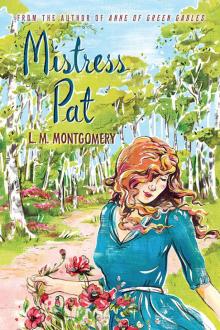 Mistress Pat
Mistress Pat A Tangled Web
A Tangled Web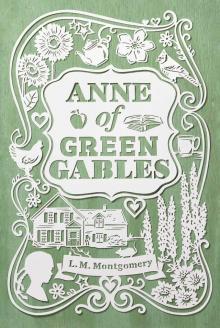 Anne of Green Gables
Anne of Green Gables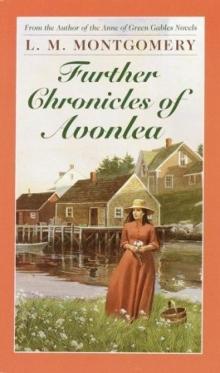 Further Chronicles of Avonlea
Further Chronicles of Avonlea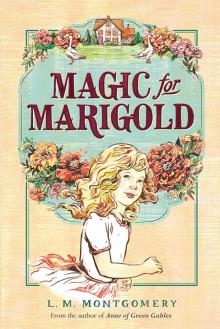 Magic for Marigold
Magic for Marigold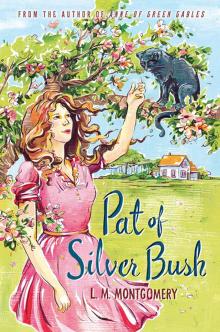 Pat of Silver Bush
Pat of Silver Bush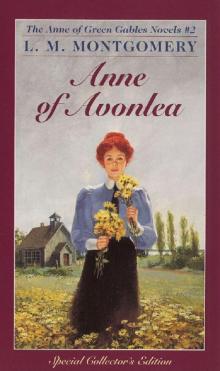 Anne of Avonlea
Anne of Avonlea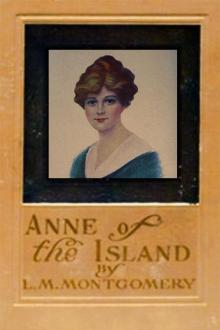 Anne of the Island
Anne of the Island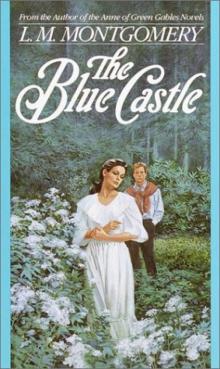 The Blue Castle
The Blue Castle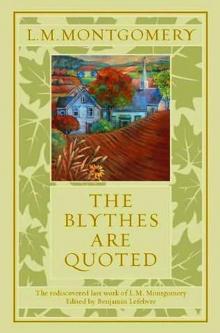 The Blythes Are Quoted
The Blythes Are Quoted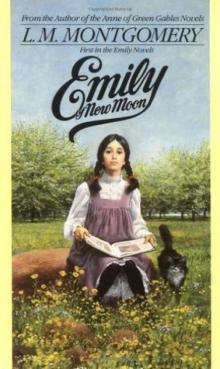 Emily of New Moon
Emily of New Moon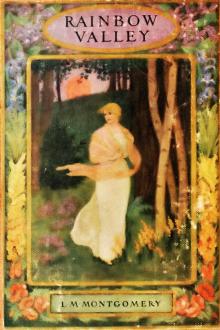 Rainbow Valley
Rainbow Valley Rilla of Ingleside
Rilla of Ingleside 07 - Rainbow Valley
07 - Rainbow Valley Anne of Green Gables (Penguin)
Anne of Green Gables (Penguin) Emily Climbs
Emily Climbs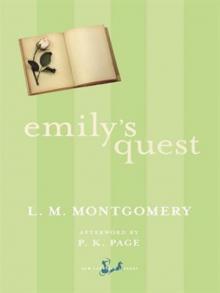 Emily's Quest
Emily's Quest A Name for Herself
A Name for Herself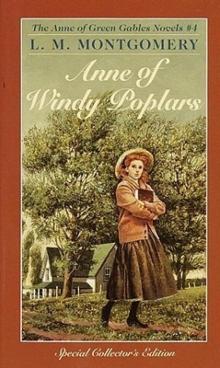 Anne of Windy Poplars
Anne of Windy Poplars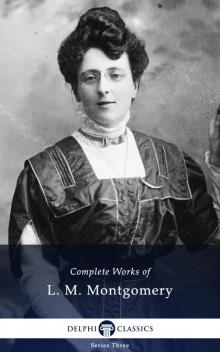 The Complete Works of L M Montgomery
The Complete Works of L M Montgomery The Story Girl
The Story Girl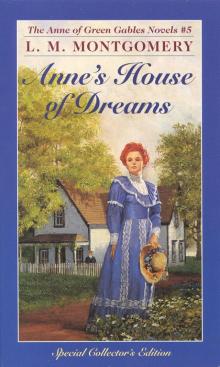 Anne's House of Dreams
Anne's House of Dreams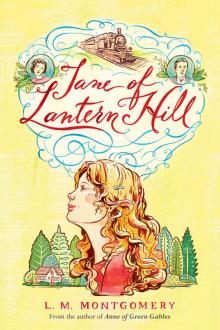 Jane of Lantern Hill
Jane of Lantern Hill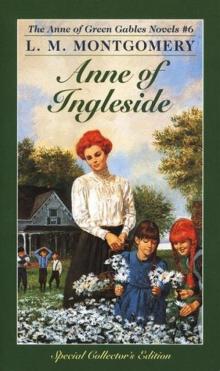 Anne of Ingleside
Anne of Ingleside